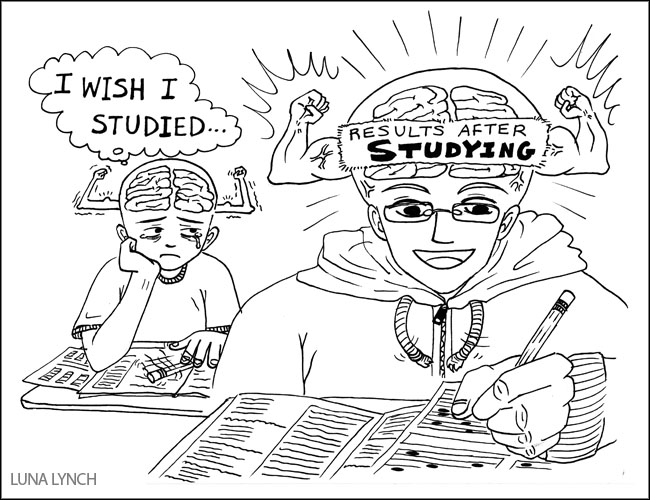
High school is often viewed as a long and arduous path towards succeeding in the future. Near its end, students often find themselves amid the stress of taking either the SAT or ACT.
For students dreading the uncertainty of testing season, there are several tips to keep in mind.
Mathematics and Summit Test Prep teacher Adam Jacobs says, “There’s so much competition out there to get into colleges, and parents and students do feel a need to keep up. There are a lot of prep classes out there, and I really think they do help because it exposes you to all the aspects of the test and it really breaks down the test for you, so you can be more prepared.”
“I’ve been taking SAT prep classes and studying and doing practice questions. Part of the SAT class is taking PSATs. Another part is going over methods and tricks for taking the actual test,” says junior Rahul Joshi.
Test prep booklets are another popular choice. “My worst section was writing, [so] I reviewed basic grammar strategies. I practiced a lot of the grammar questions in my test-prep book,” says senior Sophia Wienbar. “It was useful for getting used to the format of the test and [it showed] the rubric for grading the essays.”
Wienbar shares some of the other preparation methods she used. “Taking practice tests or even the free SAT questions of the day helps because they get you used to the type of questions that [the SAT] asks.”
Senior Ivana Wang recommends taking both SAT and ACT practice tests before choosing which to take, or if both should be taken. She says, “I took practice tests for both and felt like I did a slightly better job on the ACT.”
For the test itself, veterans of the SAT provide a number of suggestions.
“You shouldn’t freak out if there’s a problem you don’t know how to do,” says Wang. “Skip it and come back to it later if you have time. You don’t want to waste so much time on it that you don’t get to problems you could have completed.”
English and Summit Test Prep teacher Victoria Daniel offers her own tips. “You should try to eliminate answers, and if you can eliminate two or more answers, you should guess. If you can’t, you should leave it blank. A lot of people know that by leaving it blank you can actually increase your score instead of randomly guessing.”
“If I have three or fewer left, then I’ll choose at random,” says Wienbar. “I personally hate leaving questions unanswered so sometimes I guess even if I can’t eliminate an option, although I do not recommend this tactic.”
For this reason, many believe that the SAT’s system of point reduction makes it more difficult than the ACT, which does not deduct points for wrong answers. However, both have a range of questions from easy to difficult.
Daniel says, “There are definitely tricky answers or trap responses, and you can learn to look for some of those. For instance, in the reading section, any answer that is way generalized [is usually incorrect]. You shouldn’t put that answer down—same with the math. There [is] sometimes an answer that just seems to repeat the same numbers in the question. It’s too simple. So be careful for the overgeneralized or too simplistic. Those are almost always wrong.”
Sometimes the greatest difficulty lies in the preparation process. Wang says, “[The hardest part is] motivating myself to study for them.”
Although there are many ways to prepare for the SAT or ACT, it is important to remember that testing is not the only preparation for college that counts.
“[You] are more than a number,” says Daniel. “I know we are very numbers driven and all that, but you do your best, and you let it go. Do not let it define you.”
Wienbar adds, “Don’t make such a big deal about your scores. Although they do matter, they aren’t the only thing that matters, and you can always take the test multiple times. After I realized this, I was much more relaxed during the test and was able to focus on actually taking the test rather than just being preoccupied with the results.”





